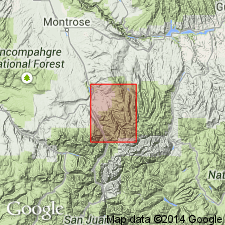
- Usage in publication:
-
- Henson tuff*
- Modifications:
-
- Original reference
- Dominant lithology:
-
- Tuff
- AAPG geologic province:
-
- San Juan Mountains province
Summary:
Henson tuff. Pyroclastic formation; chiefly well-bedded fine-grained greenish- or brownish-gray aandy andesitic tuffs; no calcareous shales or limestone layers, in which respect it differs from Burns tuff. Thickness 75 to 600 feet. Is uppermost formation of Silverton [volcanic] series. In Silverton folio upper part was put in Potosi [volcanic] series and lower part in underlying pyroxene andesite. No fossils. Age is Miocene.
Named from Henson Creek, on the headwaters of which the tuffs have their best known development. Especially well exposed and reach max. thickness on divide btw. North Fork of Henson Creek and Cow Creek, Ouray 15-min quadrangle, Ouray and Hinsdale Cos., southwestern CO.
Source: Publication; US geologic names lexicon (USGS Bull. 896, p. 942).
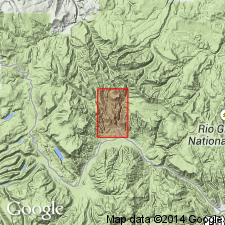
- Usage in publication:
-
- Hinsdale volcanic series*
- Modifications:
-
- Areal extent
- AAPG geologic province:
-
- San Juan Mountains province
Summary:
[table opp. p. 12]; USGS Prof. Paper 131-G, table opp. p. 184. Hinsdale volcanic series is later than Fisher quartz latite (Miocene) and Creede formation (0 to 2,000 feet thick, and also of Miocene age). Latter formation rests unconformably on Potosi volcanic series in Creede district, Mineral Co., southwestern Colorado.
Source: Publication; US geologic names lexicon (USGS Bull. 896, p. 961-962).
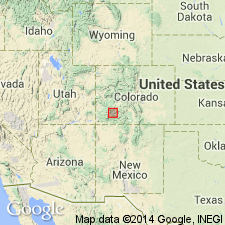
- Usage in publication:
-
- Henson Formation*
- Modifications:
-
- Redescribed
- Dominant lithology:
-
- Tuff
- Breccia
- Latite
- AAPG geologic province:
-
- San Juan Mountains province
Summary:
Redescribed from Henson Tuff to Henson Formation and revised to include a previously unnamed pyroxene-quartz latite as its basal unit. As used in this report, Henson includes andesitic to rhyodacitic tuffs, flows, and breccias, a few local rhyolite flows and tuffs, and a local quartz latite welded ash-flow tuff. Has a maximum thickness of about 1,000 ft. Is the upper formation of Silverton Volcanic Series. Overlies Burns Formation (formerly called Burns Latite). Underlies Gilpin Peak Tuff (new) of Potosi Volcanic Group (formerly called Potosi Volcanic Series). Assigned to the middle and late Tertiary. Known in the San Juan volcanic depression, CO, in the San Juan Mountain province.
Source: GNU records (USGS DDS-6; Denver GNULEX).
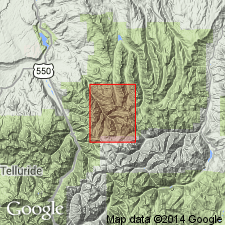
- Usage in publication:
-
- Henson Formation*
- Modifications:
-
- Mapped 1:24k (Hinsdale and Ouray Cos, CO)
- Dominant lithology:
-
- Lava
- Breccia
- Tuff
- AAPG geologic province:
-
- San Juan Mountains province
Summary:
Is mapped as upper formation (of two) of the Silverton Volcanic Group (Oligocene) in southeast part of quadrangle in southeast Ouray and western Hinsdale Cos, CO (San Juan Mountain province). Overlies Burns Formation of Silverton Volcanic Group; overlain Potosi Volcanic Group (Oligocene). Map unit described as interbedded dark-gray porphyritic lava flows, flow breccias, and medium-gray locally cross-bedded tuffs of mainly andesitic composition; phenocrysts of two pyroxenes and plagioclase feldspar in a cryptocrystalline groundmass. In upper part, light-gray biotite crystal-rich welded ash-flow tuff of quartz latitic composition is separately mapped; about 200 ft thick, near top of formation. Formation is locally absent in map area owing in part to nondeposition and in part to erosion. [Total thickness of formation is not given; may exceed 1,000 ft thick based on map expression.]
Source: GNU records (USGS DDS-6; Denver GNULEX).
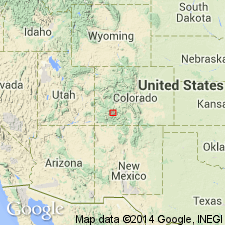
- Usage in publication:
-
- Henson Formation*
- Modifications:
-
- Revised
- AAPG geologic province:
-
- San Juan Mountains province
Summary:
Removed from Silverton Volcanic Group (a term abandoned) in the San Juan Mountain province. Is part of a postcollapse accumulation of lava, breccia, and sediment within the San Juan caldera in the Oligocene. Is equivalent to Burns Formation and to Sheep Mountain Formation.
Source: GNU records (USGS DDS-6; Denver GNULEX).
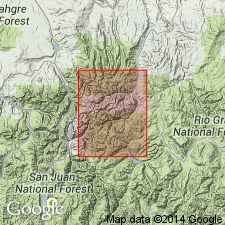
- Usage in publication:
-
- Henson Member*
- Modifications:
-
- Revised
- AAPG geologic province:
-
- San Juan Mountains province
Summary:
Henson Formation reduced to Henson Member of Silverton Volcanics. Silverton Volcanics reinstated, but restricted to Henson Member, pyroxene andesite member, and Burns Member. The three members are not a sequence; they are a complexly interfingering assemblage. Henson includes a tuffaceous sandstone more than 200 m thick and mudflow breccia as much as 250 m thick. Was deposited adjacent to the San Juan and Uncompahgre calderas after their collapse, but before subsidence of the Silverton caldera. Of Oligocene age. Report area shows parts of Silverton in Ts41 to 44N, Rs4 and 5W, Hinsdale Co, CO in the San Juan Mountain province.
Source: GNU records (USGS DDS-6; Denver GNULEX).
For more information, please contact Nancy Stamm, Geologic Names Committee Secretary.
Asterisk (*) indicates published by U.S. Geological Survey authors.
"No current usage" (†) implies that a name has been abandoned or has fallen into disuse. Former usage and, if known, replacement name given in parentheses ( ).
Slash (/) indicates name conflicts with nomenclatural guidelines (CSN, 1933; ACSN, 1961, 1970; NACSN, 1983, 2005, 2021). May be explained within brackets ([ ]).

